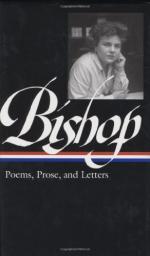|
This section contains 1,092 words (approx. 4 pages at 300 words per page) |

|
The eerie clarity and brilliant surfaces of Elizabeth Bishop's work have always been easy to see. Her first book, North and South (1946), contained poems that have been widely memorized, imitated, turned to as antidotes for slackness, and anthologized: "Wading at Wellfleet," "The Man-Moth," "The Monument," "Florida," "Roosters," and "The Fish" are among these early poems—not bad for a first book.
But though the achievement and the reputation increased with the publication of A Cold Spring (1955, Pulitzer Prize), Questions of Travel (1965), and Complete Poems (1969, National Book Award), the whole force and unique daring of Bishop's poetry may not have been visible until her last book before her death in 1979, Geography III (1976). In the light of that book, all of her work seemed to change. The poet who might have seemed lapidary and self-effacing emerged as a radical explorer of selfhood's very nature. Critics like Helen Vendler and Harold...
|
This section contains 1,092 words (approx. 4 pages at 300 words per page) |

|


